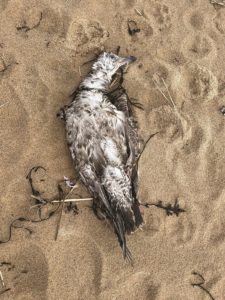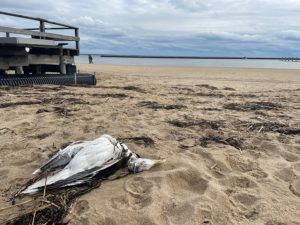PROVINCETOWN — On his daily walks along the harbor beach, Marc Guerrette occasionally sees a bird or two that has washed ashore, the result of natural animal mortality brought in by the tide.
But a few weeks ago, Guerrette, a Provincetown resident, began to observe a startling number of dead gulls on the beach, especially in the area around the Johnson Street parking lot.

After counting 26 gulls between Bubala’s Restaurant and Four Eleven Gallery on Jan. 31, Guerrette made a series of calls that rang alarm bells all the way up to the state level about the highly pathogenic H5N1 virus that has devastated wild and domestic bird populations nationwide in the last year.
The great black-backed gulls that have appeared on the Provincetown Harbor beach are, local experts agree, likely casualties of an avian influenza outbreak.
The virus cannot be confirmed in the birds until testing is conducted, however, according to state ornithologist Andrew Vitz. On Feb. 3, multiple fresh carcasses were collected for sampling and will undergo preliminary testing this week, he said.
This HPAI (Highly Pathogenic Avian Influenza) has spread rapidly across North America in the past year, infecting 58.2 million birds, according to Wendy Puryear, a molecular virologist at the Runstadler Lab of the Cummings School of Veterinary Medicine at Tufts University.
That “highly pathogenic” designation of a given influenza strain refers to its recorded effects on farmed birds, according to the Centers for Disease Control and Prevention. The rising cost of eggs and shortages at grocery stores are directly tied to the fast-spreading outbreak of H5N1 among poultry populations across the West and Midwest.
“To the best of our current knowledge, this is from a single incursion event that happened over the winter of 2021-2022 from Northern Europe,” said Kaitlin Sawatzki, a postdoctoral researcher who works with Puryear. The disease arrived in Canada and then traveled south along the Atlantic migratory flyway, she said. While wild aquatic birds and shorebirds are considered the natural “reservoir” populations for avian influenza, “spillover events” occur when the disease is transmitted to another kind of wild or domestic bird, or another species entirely.
A handful of positive cases in other animals, including skunks, coyotes, and seals, confirm that H5N1 has crossed the avian-mammal barrier, meaning that transmission has occurred between a wild bird carrying the virus and a non-avian species.
In April 2022, the first case of a human H5N1 infection was reported in Colorado. The patient, an inmate at a state prison, had helped cull infected birds at a poultry farm while on work release and experienced mild flu-like symptoms. It is the only confirmed case from this outbreak so far in the U.S., according to the CDC.
In coastal Maine, after unusual numbers of dead harbor and gray seals were found last summer, testing showed they had avian influenza. In response, the NOAA Fisheries declared an “unusual mortality event” for the populations — meaning a situation that “demands immediate response” under the Marine Mammal Protection Act.
Common Birds Ignored
No such classification exists for birds. It can be difficult to determine what an “unusual” death rate would be for common birds like great black-backed gulls because baseline information on their numbers has not been a priority for state and federal agencies and research institutions.

“I wish we lived in a world where we had a better inventory of wildlife,” said Dennis Minsky, a Provincetown naturalist and Independent columnist. “Certainly, we know about piping plovers, we know about bald eagles, we know about animals that are in the limelight,” he added. But for common wildlife, he said, data are sparser.
The Seabird Ecological Assessment Network (SEANET), a citizen science program at Tufts, deployed volunteers to survey birds in the Northeast for just this purpose, Minsky said. But the program is now defunct.
Still, the number of gull deaths happening now does appear unusual to Marc Faherty, the science coordinator for Mass Audubon Cape Cod. “Everything we know points to this clearly being avian influenza,” he said.
Wild Care, a wildlife rehabilitation clinic in Eastham, has seen an uptick in avian influenza cases across the Cape, largely in immature great black-backed gulls, according to Executive Director Stephanie Ellis. Cases have been confirmed in Chatham, Harwich, Brewster, Orleans, Wellfleet, and Provincetown.
When someone brings in a bird with flu symptoms, Wild Care staff quarantine the animal and extract a sample to send to the Runstadler Lab. If the test for H5N1 comes back positive, Wild Care euthanizes the bird.
The symptoms of HPAI in birds are similar to flu symptoms in humans: lethargy, coughing, and sneezing, said Ellis. It also causes extreme weakness, disorientation, and respiratory distress. Once birds show symptoms, the disease seems to be fatal. “I hate telling people we euthanize, but sometimes it almost feels like a blessing to relieve the suffering of these poor animals,” Ellis said.
When Guerrette set out to notify officials about the dead gulls, he called numerous town officials, including the police, who said they were unable to assist. “Our staff are not trained for the safe handling, collecting, or testing of wildlife like this,” Provincetown Assistant Town Manager Dan Riviello said via email.
That work is the state’s, Vitz confirmed. In an email, he said MassWildlife largely relies on public reporting to locate and track abnormal numbers of dead birds and collects reports by phone, email, and through a form on the state website that in turn populates a database.
The form encourages Mass. residents to report any sick or dead seabirds, including gulls, terns, cormorants, and waterfowl, or “if you find 5 or more wild birds of other species at a single location.”
MassWildlife (the Mass. Div. of Fisheries and Wildlife) worked with Wild Care and the Weymouth-based New England Wildlife Center to collect samples from the dead gulls on the Provincetown beach. Tests on the samples were still underway the Runstadler Lab at Tufts at the Independent’s deadline on Tuesday night.
After initial swabs are taken and tests are conducted at the Tufts lab, results are sent to the National Veterinary Services Lab in Ames, Iowa, which runs confirmation testing, then collates and posts nationwide data on the virus. But because that process can take months, currently posted USDA data do not include the recent “putative positive” tests that have been coming out of Massachusetts since November.
Currently, the risk of contracting HPAI for humans is extremely low. Still, “a superpower that influenza has,” as Sawatzki of the Tufts lab called it, is an ability to “reassort,” or to swap gene segments between two influenza viruses that attack the same host, producing more infectious mutations.
An HPAI outbreak in October 2022 among farmed minks in northwestern Spain, where the virus seemed to pass from mink to mink rather than solely from avian hosts to mammalian carriers, raised alarms that the virus had officially mutated to spread between mammals. As a New York Times column warned last week, another global pandemic could be on the horizon if a human gets infected with a mutated strain of H5N1.

For now, poultry flocks and domestic animals such as dogs are of greater concern, although humans should also avoid unprotected contact with sick or dead birds.
Scientists, state officials, wildlife experts, and the CDC all encourage increased biosecurity measures: generally, keeping pets away from carcasses, avoiding direct handling, and washing your hands and changing your clothes after touching even healthy birds is advised.
Ellis advises anyone who keeps poultry to call Wild Care first rather than transport a bird with flu symptoms to its facility. Wild Care will send a clinic volunteer to collect the bird instead.
Sawatzki confirmed that it is safe to eat poultry and eggs. But those who keep backyard flocks should be on the lookout for disease, she said. The symptoms are serious and obvious, she said; if your flock is infected, you will notice. In that case, Sawatzki said, backyard farmers should contact the state for advice on diagnosing the disease and next steps.
Cape Codders with bird feeders needn’t be alarmed, as no avian influenza cases have been reported in songbirds or hummingbirds. If species with known vulnerability to HPAI, such as crows, begin to frequent the site, however, Sawatzki recommended the bird feeder be taken down.



